More actions
No edit summary |
No edit summary |
||
| (2 intermediate revisions by the same user not shown) | |||
| Line 7: | Line 7: | ||
Aldurism is one of the major [[Religions]] that exists worldwide, but is mostly concentrated among Magic-using peoples as a pro-Magic religion that sometimes ventures into Magic supremacy or Magical fanaticism. Aldurism has a numerically large following but followers are usually minorities found in the [[Allorn Empire]] and the [[Regalian Empire]]. Most Aldurism worshipers are [[Kathar]] where they are roughly half the population of the Dread Empire, and Bene Rexit [[Isldar]]. Aldurism as a Religion is a Magical answer to the nihilistic view of the difficult conditions of mortal life on Aloria, and therefore being a Mage is a necessity to be an Aldurism believer. | Aldurism is one of the major [[Religions]] that exists worldwide, but is mostly concentrated among Magic-using peoples as a pro-Magic religion that sometimes ventures into Magic supremacy or Magical fanaticism. Aldurism has a numerically large following but followers are usually minorities found in the [[Allorn Empire]] and the [[Regalian Empire]]. Most Aldurism worshipers are [[Kathar]] where they are roughly half the population of the Dread Empire, and Bene Rexit [[Isldar]]. Aldurism as a Religion is a Magical answer to the nihilistic view of the difficult conditions of mortal life on Aloria, and therefore being a Mage is a necessity to be an Aldurism believer. | ||
==Origins== | ==Origins== | ||
The origins of Aldurism are well-recorded because it is both a fairly new religion and one based entirely on 8 Archmages who lived roughly at the same time. The Allorn Empire was undergoing terrible civil strife during the Arch Age, spanning 1500 to 500 BC. During this period, Archmages and princes alike waged war on one another to establish dominance, while imperial authority in the capital suffered. The Luminarchs (Gods) of Aldurism were once all mortal Archmages who were familiar with one another for a variety of reasons. Some were friends, others were even enemies to lovers, but they all came together under the guidance of Ardos with an ambition that seemed unreachable for many other Mages. As Archmages, they were individually uniquely powerful, almost indistinguishable from gods, separated only by their command over life and death itself. | The origins of Aldurism are well-recorded because it is both a fairly new religion and one based entirely on 8 Archmages who lived roughly at the same time. The Allorn Empire was undergoing terrible civil strife during the Arch Age, spanning 1500 to 500 BC. During this period, Archmages and princes alike waged war on one another to establish dominance, while imperial authority in the capital suffered. The Luminarchs (Gods) of Aldurism were once all mortal Archmages who were familiar with one another for a variety of reasons. Some were friends, others were even enemies to lovers, but they all came together under the guidance of Ardos with an ambition that seemed unreachable for many other Mages. As Archmages, they were individually uniquely powerful, almost indistinguishable from gods, separated only by their command over life and death itself. | ||
| Line 14: | Line 13: | ||
What they saw has never been revealed, but the gods were clear that their disappointment was profound and their mutual horror at the truth of the universe was deep. It was only by their lust for life and adoration of all qualities inherent in happiness that they didn't succumb to immediate nihilism, and returned to Aloria as gods to preach a new religion: Aldurism. | What they saw has never been revealed, but the gods were clear that their disappointment was profound and their mutual horror at the truth of the universe was deep. It was only by their lust for life and adoration of all qualities inherent in happiness that they didn't succumb to immediate nihilism, and returned to Aloria as gods to preach a new religion: Aldurism. | ||
==Central Message== | ==Central Message== | ||
The central message of Aldurism is that existence is filled with suffering and that life holds no meaning beyond the aimless directive imposed on it by forces beyond comprehension, and that no one has control over these directives. This inherent nihilistic view is immediately tempered with Magic, a tool to be used as a great equalizer and a mender of wrongs that can re-write the fabric of reality. To the Luminarchs, reality was created wrong even before the Dragons breathed their first breath, and therefore there is a moral and intellectual imperative among all mortals to learn Magic, to break the rules of reality, and then start breaking them to improve not only their lives but also the lives of others. In essence, Aldurism glorifies the usage of Magic, though it lacks a clear distinction on the responsible use of Magic (such as Venting), or Magic fanaticism (like Magic supremacy over mundane people). All manners of Magic interpretation are generally welcome within the faith, because it preaches communal understanding and togetherness among Mages, especially when faced with natural enemies like purists who do not distinguish between different application intentions of Magic. The faith has an afterlife called the Magna Arcana, in which the Gods promise a magical superreality where souls can dictate whatever they experience or interact with, a pure bliss existence while the echo of their soul and magical power empowers the Luminarchs and acts as their reward for their stewardship and guidance. | The central message of Aldurism is that existence is filled with suffering and that life holds no meaning beyond the aimless directive imposed on it by forces beyond comprehension, and that no one has control over these directives. This inherent nihilistic view is immediately tempered with Magic, a tool to be used as a great equalizer and a mender of wrongs that can re-write the fabric of reality. To the Luminarchs, reality was created wrong even before the Dragons breathed their first breath, and therefore there is a moral and intellectual imperative among all mortals to learn Magic, to break the rules of reality, and then start breaking them to improve not only their lives but also the lives of others. In essence, Aldurism glorifies the usage of Magic, though it lacks a clear distinction on the responsible use of Magic (such as Venting), or Magic fanaticism (like Magic supremacy over mundane people). All manners of Magic interpretation are generally welcome within the faith, because it preaches communal understanding and togetherness among Mages, especially when faced with natural enemies like purists who do not distinguish between different application intentions of Magic. The faith has an afterlife called the Magna Arcana, in which the Gods promise a magical superreality where souls can dictate whatever they experience or interact with, a pure bliss existence while the echo of their soul and magical power empowers the Luminarchs and acts as their reward for their stewardship and guidance. | ||
==Gods and Goddesses== | ==Gods and Goddesses== | ||
The Gods and Goddesses of Aldurism are called Luminarchs, or “the illuminated,” who saw the beginning of time and defied its depressing reality. The pantheon is technically equal, but due to Ardos's brilliance and Catheron's superior power, there are subtle imbalances among them. | The Gods and Goddesses of Aldurism are called Luminarchs, or “the illuminated,” who saw the beginning of time and defied its depressing reality. The pantheon is technically equal, but due to Ardos's brilliance and Catheron's superior power, there are subtle imbalances among them. | ||
| Line 26: | Line 23: | ||
Ardos was the prince of Irdaal during the Mage Wars in the Allorn Arch Era, a scion in a long line of powerful Archmage rulers of the powerful Irdaal Princedom. Following Ardos's ascension to godhood, he discovered Soulechoes exist in all living things that could allow them to recall past lives, but somehow cannot by some trick of Elderlaw. It has since become his obsession, and that of his followers, the Ardosar, to unlock the secret of Soul Recall and discover past lives, for the betterment or enrichment of current lives. | Ardos was the prince of Irdaal during the Mage Wars in the Allorn Arch Era, a scion in a long line of powerful Archmage rulers of the powerful Irdaal Princedom. Following Ardos's ascension to godhood, he discovered Soulechoes exist in all living things that could allow them to recall past lives, but somehow cannot by some trick of Elderlaw. It has since become his obsession, and that of his followers, the Ardosar, to unlock the secret of Soul Recall and discover past lives, for the betterment or enrichment of current lives. | ||
: ''For more on Soul Recall, read [[Soul Recall|this Expanded Lore]]'' | : ''For more on Soul Recall, read [[Soul Recall|this Expanded Lore]]'' | ||
====Ben-Halur, Mighty Reveling Shepherd==== | ====Ben-Halur, Mighty Reveling Shepherd==== | ||
[[File:Fhedjnh.png|left|frameless|250px]] | [[File:Fhedjnh.png|left|frameless|250px]] | ||
| Line 34: | Line 29: | ||
Ben-Halur was the only Luminarch who was not an Archmage Prince. As a mortal, Ben-Halur was a Selvath from the Golden Forests in the north of Irdaal. In an attempt to save his people from the march of the Archmages, he joined forces with Ardos and the other Luminarchs. While the other Luminarchs have a great variety of relationships, every single one of them is a fond friend of Ben-Halur who, in turn, is also the most common to appear before the faithful to aid them in their struggles. Ben-Halur also represents an aspect of transhumanism, as he incorporates the parts of animals into himself to become bigger and stronger, transcending the limitations of natural creation. | Ben-Halur was the only Luminarch who was not an Archmage Prince. As a mortal, Ben-Halur was a Selvath from the Golden Forests in the north of Irdaal. In an attempt to save his people from the march of the Archmages, he joined forces with Ardos and the other Luminarchs. While the other Luminarchs have a great variety of relationships, every single one of them is a fond friend of Ben-Halur who, in turn, is also the most common to appear before the faithful to aid them in their struggles. Ben-Halur also represents an aspect of transhumanism, as he incorporates the parts of animals into himself to become bigger and stronger, transcending the limitations of natural creation. | ||
: ''For more on the Golden Forests, read [[Golden Forests|this Expanded Lore]]'' | : ''For more on the Golden Forests, read [[Golden Forests|this Expanded Lore]]'' | ||
====Catheron, Binder of the Astral Flames==== | ====Catheron, Binder of the Astral Flames==== | ||
[[File:Dh.png|left|frameless|250px]] | [[File:Dh.png|left|frameless|250px]] | ||
| Line 47: | Line 41: | ||
Ravala is one of the more subtle Luminarchs because her presence on the wider stage is largely unknown. She was once a Princess of the Allorn Empire on the path of the Cold March, the Dregodar exile to Ellador. While the Dregodar thought they had abandoned all Allorn sensibilities, they could not dismiss the most Elven of qualities: fascination for Magic and a fear of death. In these qualities, Ravala hid herself among the Dregodar, unfolding a plan in time that Onalinn had foreseen to trick Aurora, and secretly bend Isldar society to worship her instead. Ravala has some poorly understood connection to the Hollow and the Malefica but is vehemently opposed to it. | Ravala is one of the more subtle Luminarchs because her presence on the wider stage is largely unknown. She was once a Princess of the Allorn Empire on the path of the Cold March, the Dregodar exile to Ellador. While the Dregodar thought they had abandoned all Allorn sensibilities, they could not dismiss the most Elven of qualities: fascination for Magic and a fear of death. In these qualities, Ravala hid herself among the Dregodar, unfolding a plan in time that Onalinn had foreseen to trick Aurora, and secretly bend Isldar society to worship her instead. Ravala has some poorly understood connection to the Hollow and the Malefica but is vehemently opposed to it. | ||
: ''For more on the Cold March, read [[Cold March|this Expanded Lore]]'' (not yet written) | : ''For more on the Cold March, read [[Cold March|this Expanded Lore]]'' (not yet written) | ||
====Apotheon, Synth-Gilded Arcaneforge==== | ====Apotheon, Synth-Gilded Arcaneforge==== | ||
[[File:43ge3.png|left|frameless|250px]] | [[File:43ge3.png|left|frameless|250px]] | ||
| Line 53: | Line 46: | ||
Apotheon was the Prince of a relatively small but wealthy Princedom that would eventually come to constitute a part of the Vasaal City States after his ascension to godhood. He was the member of a family who had long worked with Magitech and other forms of technology, but he was the first Archmage of their ranks, and able to magically commune with machines to give them life-like intelligence without the need for Unicores, Unimatrixes, or Soulcores, by creating thousands of mini-cores that could all think together like synapses on a brain. Apotheon also hated the division of the Elven people, and later of all creation of Ailor, preached for mixing to erase individual flaws. | Apotheon was the Prince of a relatively small but wealthy Princedom that would eventually come to constitute a part of the Vasaal City States after his ascension to godhood. He was the member of a family who had long worked with Magitech and other forms of technology, but he was the first Archmage of their ranks, and able to magically commune with machines to give them life-like intelligence without the need for Unicores, Unimatrixes, or Soulcores, by creating thousands of mini-cores that could all think together like synapses on a brain. Apotheon also hated the division of the Elven people, and later of all creation of Ailor, preached for mixing to erase individual flaws. | ||
====Myrrhon, Scion of the Golden Dissent==== | ====Myrrhon, Scion of the Golden Dissent==== | ||
[[File:Ndndg.png|left|frameless|250px]] | [[File:Ndndg.png|left|frameless|250px]] | ||
Myrrhon is the God of wealth and prosperity but perhaps not in a way that most believers would come to expect. Myrrhon was a scion of a powerful Amontaari family who came to despise wealth, capital, and all the little rules associated with currency and property. When the Luminarchs ascended, it was Myrrhon who was most disgusted by the social constructs that came into being as a consequence of civilization and free will, mostly the concept of capitalism. Rather than preaching reform, however, he preaches the very base dissolution of currency and property altogether, saying that if life is meaningless without satisfaction, then the accumulation of wealth is just an unnecessary obstacle to the pursuit of happiness. | Myrrhon is the God of wealth and prosperity but perhaps not in a way that most believers would come to expect. Myrrhon was a scion of a powerful Amontaari family who came to despise wealth, capital, and all the little rules associated with currency and property. When the Luminarchs ascended, it was Myrrhon who was most disgusted by the social constructs that came into being as a consequence of civilization and free will, mostly the concept of capitalism. Rather than preaching reform, however, he preaches the very base dissolution of currency and property altogether, saying that if life is meaningless without satisfaction, then the accumulation of wealth is just an unnecessary obstacle to the pursuit of happiness. | ||
He is a wealthy god because he gives money. Money to the poor, money to the needy, magical money to those who cannot make it, and the spells for those who can. Money to disassemble financial systems, money to render currency obsolete, and money to end capital. If one were to ever ask why so many people in Crookback can afford expensive clothes or food while being unemployed, it is because Myrrhon just creates money for them so they can pursue their happiness, ambitions, and hobbies. Myrrhon is only unable to destroy capitalism because the | He is a wealthy god because he gives money. Money to the poor, money to the needy, magical money to those who cannot make it, and the spells for those who can. Money to disassemble financial systems, money to render currency obsolete, and money to end capital. If one were to ever ask why so many people in Crookback can afford expensive clothes or food while being unemployed, it is because Myrrhon just creates money for them so they can pursue their happiness, ambitions, and hobbies. Myrrhon is only unable to destroy capitalism because he is trying to force true non-fiscal anarchy onto the world, which the even the most anti-capitalist Gods are against. | ||
====Vel-Manon, Blooming Empress Serenade==== | ====Vel-Manon, Blooming Empress Serenade==== | ||
[[File:Elflady.png|left|frameless|250px]] | [[File:Elflady.png|left|frameless|250px]] | ||
| Line 64: | Line 55: | ||
Vel-Manon knew both the sting of rejection and the exhilaration of romance, and she knew how to best share it with others. Between Bel-Halur and Vel-Manon there is a great friendship and mutual interest in seeing genuine kindness and good things happen to the faithful, often acting as a barrier to the more cruel intentions of Catheron and the dispassionate existence of Ardos and Onalinn. Supposedly, it was Vel-Manon who helped the other Luminarchs to break past the protections of Sassrakand and assail Elderlaw itself. | Vel-Manon knew both the sting of rejection and the exhilaration of romance, and she knew how to best share it with others. Between Bel-Halur and Vel-Manon there is a great friendship and mutual interest in seeing genuine kindness and good things happen to the faithful, often acting as a barrier to the more cruel intentions of Catheron and the dispassionate existence of Ardos and Onalinn. Supposedly, it was Vel-Manon who helped the other Luminarchs to break past the protections of Sassrakand and assail Elderlaw itself. | ||
====Onalinn, Infinite Scribe of Perfection==== | ====Onalinn, Infinite Scribe of Perfection==== | ||
[[File:Woman1womanwoman.png|left|frameless|250px]] | [[File:Woman1womanwoman.png|left|frameless|250px]] | ||
| Line 70: | Line 60: | ||
On some level, Onalinn cares for their worshipers. After all, when they try to commune with them, Onalinn still gives them the information they seek or the understanding of future events they crave. However, at the same time, the mourning of the other Luminarchs at the person Onalinn once was is profound, with clear indications from Ben-Halur and Vel-Manon in particular that the Draconic incomprehensible rotted away every part of Onalinn's vibrant personality until there was nothing left but a machine that if it were any other mortal, they would have put to rest. Some of their faithful hope to restore her mind one day and restore their favored Luminarch. | On some level, Onalinn cares for their worshipers. After all, when they try to commune with them, Onalinn still gives them the information they seek or the understanding of future events they crave. However, at the same time, the mourning of the other Luminarchs at the person Onalinn once was is profound, with clear indications from Ben-Halur and Vel-Manon in particular that the Draconic incomprehensible rotted away every part of Onalinn's vibrant personality until there was nothing left but a machine that if it were any other mortal, they would have put to rest. Some of their faithful hope to restore her mind one day and restore their favored Luminarch. | ||
==Priestly Activities== | ==Priestly Activities== | ||
Aldurism has a formal priesthood called the Luminaria, with each priest being referred to as a Luminar. There exist several Luminaria seminars across the world, with the most notables being located in the Golden Fields in the Allorn Empire, in the capital of Parthanaar, the Kathar Empire, and several existing in south Solleria in the Regalian Empire, with smaller ones spread all over. Luminaria seminars act both as priestly education and Magic schools, teaching both disciplines at the same time, as any priest of Aldurism must also be a competent mage capable of teaching others. Priestly activities mostly involve private prayer sessions, traveling between households, and holding private services in front of altars or offerings to the gods, often by using theological rhetoric or debate to approach the moral imperative to use Magic to ease the suffering of existence. | Aldurism has a formal priesthood called the Luminaria, with each priest being referred to as a Luminar. There exist several Luminaria seminars across the world, with the most notables being located in the Golden Fields in the Allorn Empire, in the capital of Parthanaar, the Kathar Empire, and several existing in south Solleria in the Regalian Empire, with smaller ones spread all over. Luminaria seminars act both as priestly education and Magic schools, teaching both disciplines at the same time, as any priest of Aldurism must also be a competent mage capable of teaching others. Priestly activities mostly involve private prayer sessions, traveling between households, and holding private services in front of altars or offerings to the gods, often by using theological rhetoric or debate to approach the moral imperative to use Magic to ease the suffering of existence. | ||
Communal prayer in large groups happens without a priest, as priestly affairs are reserved for private situations. Despite having a clear priesthood, there is no formal hierarchy. Luminars retire to the Luminaria seminar to teach, while Luminars who graduate are of equal standing and can take on pupils to bring to the Luminar seminary in due time. Aldurism is considered a legal religion in Regalia, so Luminars have voting rights in assemblies. It should be noted, however, that Aldurism’s legality is predicated on the most palatable interpretation of the faith, meaning the pro-responsible usage of Magic. There are fringe interpretations and members of the Aldurism faith that are strictly illegal, like Mage supremacy ideals which would necessarily see the Emperor replaced with a Mage either from or outside the Kade Family, or apathy to dangerous usage of Magic, which causes corruption to the environment and people. | Communal prayer in large groups happens without a priest, as priestly affairs are reserved for private situations. Despite having a clear priesthood, there is no formal hierarchy. Luminars retire to the Luminaria seminar to teach, while Luminars who graduate are of equal standing and can take on pupils to bring to the Luminar seminary in due time. Aldurism is considered a legal religion in Regalia, so Luminars have voting rights in assemblies. It should be noted, however, that Aldurism’s legality is predicated on the most palatable interpretation of the faith, meaning the pro-responsible usage of Magic. There are fringe interpretations and members of the Aldurism faith that are strictly illegal, like Mage supremacy ideals which would necessarily see the Emperor replaced with a Mage either from or outside the Kade Family, or apathy to dangerous usage of Magic, which causes corruption to the environment and people. | ||
{{Religion}} | |||
{{Accreditation | |||
|Artists = MonMarty | |||
|Writers = MonMarty | |||
|Processors = MantaRey, birdsfoot_violet, Etrees, Firefan96 | |||
}} | |||
[[category:Religion]] | |||
Latest revision as of 08:23, 14 January 2025
| Aldurism | |
|---|---|
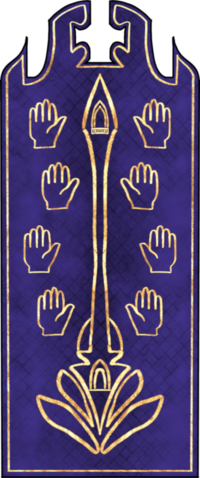 | |
| Religion | |
| Pronunciation | Al-dur-ism |
| Origins | During the Arch Age, roughly 1300 BC. |
| Deities | |
| 8 Gods, among which is one leader. | |
Aldurism is one of the major Religions that exists worldwide, but is mostly concentrated among Magic-using peoples as a pro-Magic religion that sometimes ventures into Magic supremacy or Magical fanaticism. Aldurism has a numerically large following but followers are usually minorities found in the Allorn Empire and the Regalian Empire. Most Aldurism worshipers are Kathar where they are roughly half the population of the Dread Empire, and Bene Rexit Isldar. Aldurism as a Religion is a Magical answer to the nihilistic view of the difficult conditions of mortal life on Aloria, and therefore being a Mage is a necessity to be an Aldurism believer.
Origins
The origins of Aldurism are well-recorded because it is both a fairly new religion and one based entirely on 8 Archmages who lived roughly at the same time. The Allorn Empire was undergoing terrible civil strife during the Arch Age, spanning 1500 to 500 BC. During this period, Archmages and princes alike waged war on one another to establish dominance, while imperial authority in the capital suffered. The Luminarchs (Gods) of Aldurism were once all mortal Archmages who were familiar with one another for a variety of reasons. Some were friends, others were even enemies to lovers, but they all came together under the guidance of Ardos with an ambition that seemed unreachable for many other Mages. As Archmages, they were individually uniquely powerful, almost indistinguishable from gods, separated only by their command over life and death itself.
It was that very distinction that drove them to try and assail Elderlaw, the natural Magic of Aloria. How this exactly happened is not completely understood, but it is known that the eight of them broke into Sassrakkand and compromised its most sacred core to magically assault Elderlaw and violate the banishment of Elderlaw among mortals imposed by the Dragons many millennia ago. In essence, they broke into Elderlaw Magic, stole part of it, and then used it to create a greater understanding of the world. They peered back in time using Elderlaw to witness events of the creation of everything - the birth of the Dragons, the purpose of the Primevals, and the meaning of existence.
What they saw has never been revealed, but the gods were clear that their disappointment was profound and their mutual horror at the truth of the universe was deep. It was only by their lust for life and adoration of all qualities inherent in happiness that they didn't succumb to immediate nihilism, and returned to Aloria as gods to preach a new religion: Aldurism.
Central Message
The central message of Aldurism is that existence is filled with suffering and that life holds no meaning beyond the aimless directive imposed on it by forces beyond comprehension, and that no one has control over these directives. This inherent nihilistic view is immediately tempered with Magic, a tool to be used as a great equalizer and a mender of wrongs that can re-write the fabric of reality. To the Luminarchs, reality was created wrong even before the Dragons breathed their first breath, and therefore there is a moral and intellectual imperative among all mortals to learn Magic, to break the rules of reality, and then start breaking them to improve not only their lives but also the lives of others. In essence, Aldurism glorifies the usage of Magic, though it lacks a clear distinction on the responsible use of Magic (such as Venting), or Magic fanaticism (like Magic supremacy over mundane people). All manners of Magic interpretation are generally welcome within the faith, because it preaches communal understanding and togetherness among Mages, especially when faced with natural enemies like purists who do not distinguish between different application intentions of Magic. The faith has an afterlife called the Magna Arcana, in which the Gods promise a magical superreality where souls can dictate whatever they experience or interact with, a pure bliss existence while the echo of their soul and magical power empowers the Luminarchs and acts as their reward for their stewardship and guidance.
Gods and Goddesses
The Gods and Goddesses of Aldurism are called Luminarchs, or “the illuminated,” who saw the beginning of time and defied its depressing reality. The pantheon is technically equal, but due to Ardos's brilliance and Catheron's superior power, there are subtle imbalances among them.
Ardos, Quill of Brilliant Creation
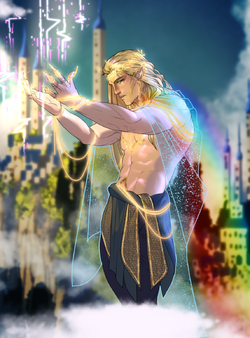
Ardos is the first among the Luminarchs, the first to pierce the unknowable shroud of Elderlaw, and the architect of their great quest. He is conventionally seen as the leader of the pantheon, even if in practicality all the Gods are equal. Ardos is called the Quill of Brilliant Creation because he is considered the divine embodiment of life. When the Luminarchs stole Elderlaw, it was Ardos who inherited the power to create life itself. He is the patron of design, the example to which all leaders and strategists look for guidance, and the lord of the faithful who blesses them with healthy and promising children, and ambitions in their adult lives to achieve and perform great feats. To be considered powerful or have good leadership qualities is called “Ardalon.”
Ardos was the prince of Irdaal during the Mage Wars in the Allorn Arch Era, a scion in a long line of powerful Archmage rulers of the powerful Irdaal Princedom. Following Ardos's ascension to godhood, he discovered Soulechoes exist in all living things that could allow them to recall past lives, but somehow cannot by some trick of Elderlaw. It has since become his obsession, and that of his followers, the Ardosar, to unlock the secret of Soul Recall and discover past lives, for the betterment or enrichment of current lives.
- For more on Soul Recall, read this Expanded Lore
Ben-Halur, Mighty Reveling Shepherd
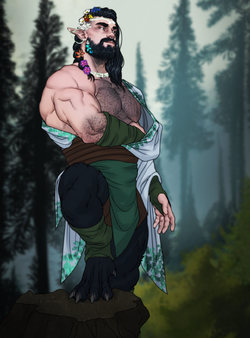
Ben-Halur is a character of massive contradictions, but what is certain is that if there were ever a god who could be considered the kindest or most softhearted among religions, it would be Ben-Halur. Ben-Halur is the god of revelry, parties, and entertainment. He is the patron of Mage communion, the idea that Mages should fight for each others’ rights and well-being and find a common cause to spread kindness. When Elderlaw was taken, Ben-Halur inherited the power of Body Magic and the self, which he developed further into the known school used in the modern day. Ben-Halur embodies the desire of Mages to use Magic in ways to enjoy life, and aim to dissuade and disable, rather than maim or kill.
Ben-Halur was the only Luminarch who was not an Archmage Prince. As a mortal, Ben-Halur was a Selvath from the Golden Forests in the north of Irdaal. In an attempt to save his people from the march of the Archmages, he joined forces with Ardos and the other Luminarchs. While the other Luminarchs have a great variety of relationships, every single one of them is a fond friend of Ben-Halur who, in turn, is also the most common to appear before the faithful to aid them in their struggles. Ben-Halur also represents an aspect of transhumanism, as he incorporates the parts of animals into himself to become bigger and stronger, transcending the limitations of natural creation.
- For more on the Golden Forests, read this Expanded Lore
Catheron, Binder of the Astral Flames
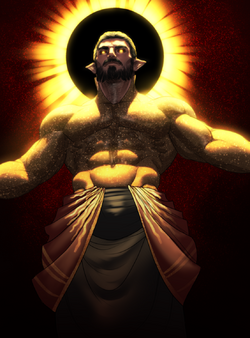
Catheron is the stereotypical image of an Allorn Archmage in the Arch Era. Most powerful among the Luminarchs, Catheron is the crystallized embodiment of "might make right through Magic.” He is the god of Magic manifestation, of the right to rule for Mages, and of the superiority of Magic as a means to an end, to anything else. He preaches the necessity for Arcanocracy, government forms ruled purely by Mages due to their inherent superiority to the mundane, and he is considered the founder of the Kathar given his strong connections with their founding cults, as he had strong connections with their founding cults. To some, Catheron is worshiped out of fear to ward the mind against the threat of the corrupting and seductive power of Magic, and the evil it enables.
Catheron was the most powerful Archmage who resides on the continent that would later form the Dread Empire, and much of the Kathar's modern teachings come from his hand. While the other Archmages had varied reasons for their assault on Elderlaw, for Catheron it was pure greed for power and to strengthen the Eclipse Witches, his covenant of students and supporters. He is continually prayed to for divine guidance on the usage of Magic. Catheron is held to conformity with the other Luminarchs only by the brilliance of Ardos who always outsmarts Catheron, who nonetheless attempts to overturn their hierarchy and become the new leader of the pantheon.
Ravala, Mistress of the Hoarfrost
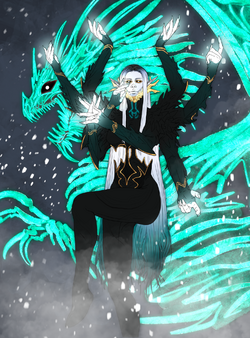
Goddess of death, schemer of the frost, the bride of Iskaldor the Undead Dragon, and mother of the Bene Rexit - Ravala has many names, but her primary function in the pantheon is to serve as the Goddess of death who shepherds the souls of the faithful into the Magna Arcana, the afterlife. Ravala is an enigmatic figure, even to the faithful, as she is mute, speaking through sign language or communicating through her beloved Dragon Iskaldor who once inhabited the corpse of the Dragon Aurora and deceived the Isldar into serving Ravala without their knowing. Ravala is prayed to for a long life and a good death, but also for the means to avoid death or to invoke longevity because Magic can often be used to extend life beyond what is naturally possible.
Ravala is one of the more subtle Luminarchs because her presence on the wider stage is largely unknown. She was once a Princess of the Allorn Empire on the path of the Cold March, the Dregodar exile to Ellador. While the Dregodar thought they had abandoned all Allorn sensibilities, they could not dismiss the most Elven of qualities: fascination for Magic and a fear of death. In these qualities, Ravala hid herself among the Dregodar, unfolding a plan in time that Onalinn had foreseen to trick Aurora, and secretly bend Isldar society to worship her instead. Ravala has some poorly understood connection to the Hollow and the Malefica but is vehemently opposed to it.
- For more on the Cold March, read this Expanded Lore (not yet written)
Apotheon, Synth-Gilded Arcaneforge
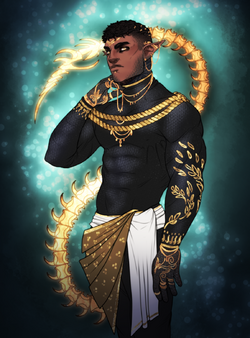
Apotheon is the Magitech God, the patron of those who try to combine technology and Magic to create a superior mix of the two, and those who believe that the variance of creation is a cruel joke concocted by the Dragons to create weaker versions of everything. Apotheon's primary goal is to usurp technologies of the past, revive and fuel them with Magic, and create a superior amalgam that can address modern needs while dismissing the inherent shortcomings of the fragility and maintenance of machines. Apotheon is the Lord of the Nano-Arcane, tiny magic-driven machines that form a single collective moving and thinking as one, and operating machines. To Apotheon, all mundane machines are weak and must be upgraded and re-envisioned.
Apotheon was the Prince of a relatively small but wealthy Princedom that would eventually come to constitute a part of the Vasaal City States after his ascension to godhood. He was the member of a family who had long worked with Magitech and other forms of technology, but he was the first Archmage of their ranks, and able to magically commune with machines to give them life-like intelligence without the need for Unicores, Unimatrixes, or Soulcores, by creating thousands of mini-cores that could all think together like synapses on a brain. Apotheon also hated the division of the Elven people, and later of all creation of Ailor, preached for mixing to erase individual flaws.
Myrrhon, Scion of the Golden Dissent
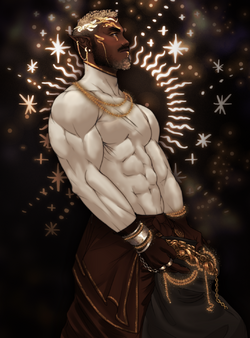
Myrrhon is the God of wealth and prosperity but perhaps not in a way that most believers would come to expect. Myrrhon was a scion of a powerful Amontaari family who came to despise wealth, capital, and all the little rules associated with currency and property. When the Luminarchs ascended, it was Myrrhon who was most disgusted by the social constructs that came into being as a consequence of civilization and free will, mostly the concept of capitalism. Rather than preaching reform, however, he preaches the very base dissolution of currency and property altogether, saying that if life is meaningless without satisfaction, then the accumulation of wealth is just an unnecessary obstacle to the pursuit of happiness. He is a wealthy god because he gives money. Money to the poor, money to the needy, magical money to those who cannot make it, and the spells for those who can. Money to disassemble financial systems, money to render currency obsolete, and money to end capital. If one were to ever ask why so many people in Crookback can afford expensive clothes or food while being unemployed, it is because Myrrhon just creates money for them so they can pursue their happiness, ambitions, and hobbies. Myrrhon is only unable to destroy capitalism because he is trying to force true non-fiscal anarchy onto the world, which the even the most anti-capitalist Gods are against.
Vel-Manon, Blooming Empress Serenade
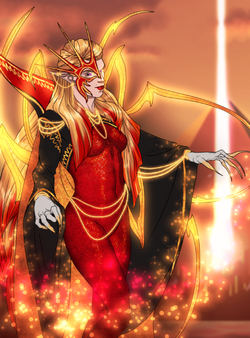
Aldurism is not an Elf-only religion, but Vel-Manon is the only non-Elven Luminarch who nonetheless appears like one. Vel-Manon in her mortal life was a Slizzar who used vast arsenals of mind-control Magic and natural Slizzar seduction capabilities to subjugate whole princedoms to her whims and eventually become their sole ruler. When the Luminarchs ascended to godhood, it was Vel-Manon who gazed at the infinity of time and felt horrified by the sheer loneliness, suffering, and isolation that people inflict on themselves. She became a preacher of communal love, whether between siblings, friends, or lovers. She wove spells for those deserving of affection and preached for those who already lived in abundance to spread their love outward. She has made the most aggressive turn from her prior scheming and controlling nature to altruism and spreading the love that she has for life.
Vel-Manon knew both the sting of rejection and the exhilaration of romance, and she knew how to best share it with others. Between Bel-Halur and Vel-Manon there is a great friendship and mutual interest in seeing genuine kindness and good things happen to the faithful, often acting as a barrier to the more cruel intentions of Catheron and the dispassionate existence of Ardos and Onalinn. Supposedly, it was Vel-Manon who helped the other Luminarchs to break past the protections of Sassrakand and assail Elderlaw itself.
Onalinn, Infinite Scribe of Perfection
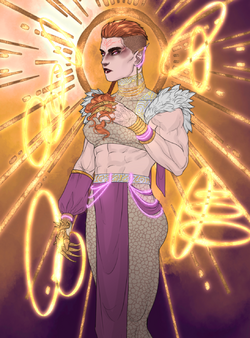
Onalinn is the Luminarch of knowledge and insight but is also a cautionary tale to the mystery of the ages, the incomprehensible nature of Dragons, and the past. When the Luminarchs ascended, Onalinn created a record of all Draconic codexes and then lost their mind in it. Through a combination of knowing everything, seeing all possible futures, and constantly peering into this Faustian bargain's worth of insight, Onalinn lost all senses of self. They became dispassionate, dispossessed of personal identity, and not too dissimilar from a machine that continued to spew facts and future-sight predictions. Even as Luminarch, they could not fully comprehend the mindscape required to process the information Dragons could and grew cold because of it.
On some level, Onalinn cares for their worshipers. After all, when they try to commune with them, Onalinn still gives them the information they seek or the understanding of future events they crave. However, at the same time, the mourning of the other Luminarchs at the person Onalinn once was is profound, with clear indications from Ben-Halur and Vel-Manon in particular that the Draconic incomprehensible rotted away every part of Onalinn's vibrant personality until there was nothing left but a machine that if it were any other mortal, they would have put to rest. Some of their faithful hope to restore her mind one day and restore their favored Luminarch.
Priestly Activities
Aldurism has a formal priesthood called the Luminaria, with each priest being referred to as a Luminar. There exist several Luminaria seminars across the world, with the most notables being located in the Golden Fields in the Allorn Empire, in the capital of Parthanaar, the Kathar Empire, and several existing in south Solleria in the Regalian Empire, with smaller ones spread all over. Luminaria seminars act both as priestly education and Magic schools, teaching both disciplines at the same time, as any priest of Aldurism must also be a competent mage capable of teaching others. Priestly activities mostly involve private prayer sessions, traveling between households, and holding private services in front of altars or offerings to the gods, often by using theological rhetoric or debate to approach the moral imperative to use Magic to ease the suffering of existence.
Communal prayer in large groups happens without a priest, as priestly affairs are reserved for private situations. Despite having a clear priesthood, there is no formal hierarchy. Luminars retire to the Luminaria seminar to teach, while Luminars who graduate are of equal standing and can take on pupils to bring to the Luminar seminary in due time. Aldurism is considered a legal religion in Regalia, so Luminars have voting rights in assemblies. It should be noted, however, that Aldurism’s legality is predicated on the most palatable interpretation of the faith, meaning the pro-responsible usage of Magic. There are fringe interpretations and members of the Aldurism faith that are strictly illegal, like Mage supremacy ideals which would necessarily see the Emperor replaced with a Mage either from or outside the Kade Family, or apathy to dangerous usage of Magic, which causes corruption to the environment and people.
| ||||||||||
| Accreditation | |||||||||
|---|---|---|---|---|---|---|---|---|---|
|
| ||||||||